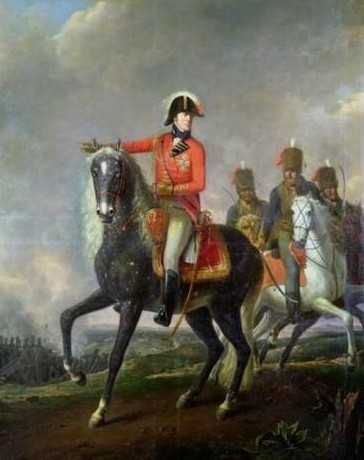
(Nicolas Louis Albert Delerive. Equestrian portrait of the Duke of Wellington. [Source])
Let's Adore Jesus-Eucharist! | Home >> Lost Sermons

(Nicolas Louis Albert Delerive. Equestrian portrait of the Duke
of Wellington.
[Source])
Msgr. Ronald Knox's brother Wilfred (himself an Anglican priest) once proposed a Christian ethics in two volumes, the first volume to be titled Respect for the Clergy, the second, simply, Other Virtues.
Knox's tongue-in-cheek proposal showed, in a characteristically English way, how lightly he wore his own clerical dignity; but the joke took for granted a background of genial good will toward ecclesiastics, against which their foibles could be the occasion for amusement. That background is gone.
What changed? Not, in the first instance, the attitude of the laity toward the clergy, but rather the attitude of clergy toward themselves. Having ceased to demand honor of one another, they slid downward into the class of shady, parasitic professions that survive by means of glibness and a disregard for middle-class proprieties.
The scale of the collapse of personal honor came home to me recently in reading about a revolution in the opposite direction in another profession. The Duke of Wellington came to power at a time when the officer corps of the British army was venal, incompetent, slothful, and generally corrupt. As historian John Keegan shows, Wellington's reform of the officer corps began not by showering it with new dignities but by demanding moral probity and taking pains to see it enforced:
Hearing after the siege of Ciudad Rodrigo that many [wounded troops] had been left without shelter, he rode thirty miles after dinner to expel some uncaring officers from their lodging and install some wounded in their place. He made the same journey the following night to ensure that his orders had been obeyed, since they had been received 'in a sulky manner', and when he found they had not, he put the officers under arrest, marched them to headquarters and had them tried and cashiered.
In a generation and a half, a new military culture was in place. Officers enforced among themselves a higher moral standard than even their superiors required of them, and an unspoken code of honor made most official discipline superfluous. Moral disgrace was ended not by a press conference but a pistol.
Like the military, the clergy has its peaks and troughs. There was a time when it was conceivable that a bishop would tell the truth -- even to his own disadvantage, and even when an opportune lie would be undetectable. Today a "scrupulous bishop" seems a near-comic contradiction in terms. Because the laity has turned against them? No, but because bishops hold their own vocation in contempt.
In an honor-driven institution, sudden and unexplained disappearances are a fact of life. You remark on an empty seat at the table and you're told with a grim smile, "Captain So-and-So will no longer be favoring us with his presence." The message is clear: we acted, before others had a chance to. In a corrupt institution, almost no vice merits dismissal, and the indignation of the corps is trained on fault-finders. The brotherhood operates not to rebuke its own malefactors, but to appeal to outsiders for amnesty. A honorable institution insists on integrity. A corrupt one pleads for "healing."
From time to time Off The Record bloggers treat impenitent clerics in terms comparable to ... say, to officers who displace wounded soldiers in order to make themselves comfortable. The bishops, bless 'em, are our teachers in this matter. We may hope that reform will come, and that in a generation or so a renewed sense of honor will prevail. In the meantime, we'll be obliged to concentrate on Other Virtues.
Copyright © 2008 Catholic Culture.
Let's Adore Jesus-Eucharist! | Home >> Lost Sermons